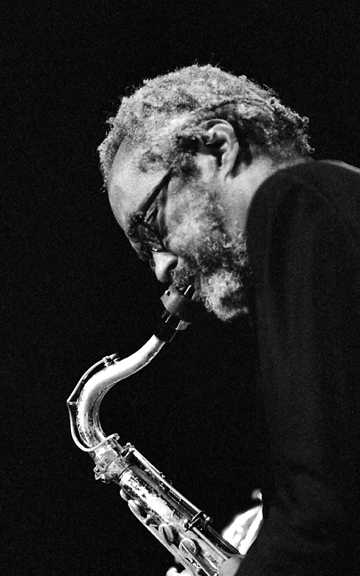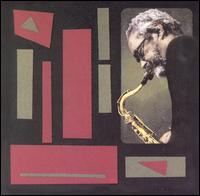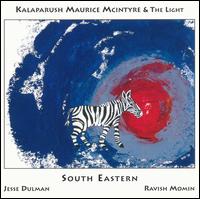
A FIRESIDE
CHAT WITH KALAPARUSHA MAURICE MCINTRYE
Music is a rare thing. Left to lone interpretation, sound in the form
of music, has no dedicated form. If music is to have any future significance
beyond pop culture relic, itshould have no formula at all. And if authenticity
is defined by honesty, the improvisers creating unrelenting radical music
are honorable. Perhaps to a fault, since society, with its narrow-minded
classifications and clichéd impressions, punishes honorable men.
Has Kalaparusha Maurice McIntrye been punished? Answering that would require
you have an educated opinion on whether Charles Gayle was punished, whether
Henry Grimes was punished, and whether Grachan Moncur III was punished.
I have an opinion, but it means little unless you disagree or agree with
me. If you are indifferent, well, indifference has punished this music
for far too long. And that being said, perhaps McIntrye was punished.
But it is a burden we should all carry, since the bed was ours to make.
The following is my conversation with Kalaparusha Maurice McIntrye, unedited
and in his own words.
FRED JUNG: Let's start from the beginning.
KALAPARUSHA MAURICE MCINTRYE: The influence was my parents. My father
was a pharmacist and my mother was a school teacher. They were upward
mobile people and Warren Smith, the drummer, lived right down on the first
floor. He is a great drummer. He is here in New York and has been here
for years and years and I have known him since I was three years old.
My parents asked me what I wanted to do and what instrument I wanted to
play. So I started with the drums, but I couldn't make it with the drums
because the drum teacher said my wrists were too stiff. A couple of years
went by and then they asked me again, what kind of instrument I wanted
to play and I told them, saxophone. They got Mr. Smith to teach me how
to play the saxophone and Mr. Smith gave me an old steel clarinet and
I didn't want to play that. Mr. Smith told me to play the saxophone, I
had to play good clarinet, so I dealt with this clarinet for six months
and they said that if I would deal with it for six months, they would
get me a saxophone. I was about nine years old when I started. I played
for a couple of years. My father was an athletic type of fellow and I
would try to impress him, so I ended up playing football and stuff. I
really got deeply into football. I played defensive end and I wanted to
become a professional football player, but I never got any larger than
a one hundred and sixty-two pounds. That was kind of impossible to play
pro ball at that weight. I got knocked out a couple of times and I realized
that I didn't have the power to be a professional football player. I had
some problems with my personal life and I ended up off about eight or
nine years worth of dust off my saxophone when I got about seventeen and
started playing the saxophone and I haven't stopped playing it since.
The horn was something I could go to and meditate and forget about all
the problems that I had in life. I ended up playing my saxophone again.
That was how I got into the music.
FJ: What was your involvement with the AACM?
KALAPARUSHA MAURICE MCINTYRE: I was at the first meeting of the AACM in
1965. I was around Chicago jamming with people and then Muhal Richard
Abrams had started this band called the Experimental Band and I was going
down to the Experimental Band rehearsals. In May of '65, they came up
with this idea, the Association for the Advancement of Creative Musicians
and Muhal told me that they were going to start having meetings and so
I went by Philip Cohran's house. He was a trumpet player.
FJ: He played with Sun Ra.
KALAPARUSHA MAURICE MCINTYRE: Yeah, he did. This was in May of '65, they
started having these meetings and that is how I got involved with the
AACM. I was at the first meeting. There was a lot of stuff going on where
black musicians were not really taking care of their own destiny and they
had attitudes toward each other and people were fighting trying to win
a war. How you going to win a war if you are fighting amongst yourselves?
We were all together trying to win the war.
FJ: Are you winning the war?
KALAPARUSHA MAURICE MCINTYRE: No, no, this war is ongoing. We haven't
won the war. This type of situation has to do with artists and artists
are different from anything that is like a political situation. This is
not like a political situation. This has to do with artists and the sense
that what we are doing is not really recognized. If a white person learns
how to do what we are doing, then they are recognized. Consequently, there
is a war that is always going on.
FJ: Why did you leave the fight in Chicago and journey to New York?
KALAPARUSHA MAURICE MCINTYRE: I left Chicago in '74 because I could only
get so large in Chicago. I could only do so much in Chicago. If I wanted
the world to recognize me, I had to come to a place that the world would
come to. New York is the marketplace for any type of art and for a whole
lot of things. New York is like the marketplace. You come here if you
have something to sell. So to stay in Chicago would have been artistic
death. I got out. My mother askedme, "Do you want to be a big fish
in a small pond or are you afraid to be a small fish in a big pond?"
I told her, "I ain't afraid of nothing." She said, "Then
why are you staying here?" So I got in a car and came to New York
City.
FJ: You immersed yourself in New York's loft scene.
KALAPARUSHA MAURICE MCINTYRE: That is true because that was the purest
thing happening in New York. It went on as long as it was supposed to
go. It lasted as long as it was supposed to last.
FJ: Have you been able to transcend the "avant-garde" label?
KALAPARUSHA MAURICE MCINTYRE: They had to come up with some kind of name,
but actually, what it is is black classical music. That is what it is.
Musicians are playing black classical music. The music is not mainstream.
It is more classical oriented due to the fact that most of the people
who play it have studied pure music, but we are black.
FJ: Documentations of your work without exception has been of your own
compositions.
KALAPARUSHA MAURICE MCINTYRE: That was one of the rules of the AACM. You
don't play no music that you didn't write. That was one of the rules of
the AACM. You never hear any AACM musicians playing Rogers and Hart or
George Gershwin songs in their concerts or on their records because that
was one of the things we were against. We were trying to become known
by our own work, our own compositions.
FJ: Would you ever consider breaking that rule?
KALAPARUSHA MAURICE MCINTYRE: Oh, sure, but it is a spiritual thing. I
probably would have a whole lot more money if I would record things that
are more popular, but I don't know, it just worked this way on a spiritual
level. It is very deep.
FJ: On your CIMP recordings, Dream Of… and South Eastern, you have
been working in a trio form.
KALAPARUSHA MAURICE MCINTYRE: That is a tuba and drums.
FJ: Why didn't you play flute on South Eastern or Dream Of…?
KALAPARUSHA MAURICE MCINTYRE: I lost my flute. Somebody stole it. One
day, I was coming from rehearsal. I had my flute hooked up on the end
of my saxophone case. It was tied with a belt or something around the
case. I stopped at a newsstand to get some candy. After I got the candy,
I picked up my horn and the flute fell off the end of the horn. I walked
back down to the train and sat down to wait for the train. I looked down
and saw that the flute had come off of my saxophone and so I ran back
up there to the newsstand and asked the guy if he had seen anything and
in New York, nobody saw nothing. I ran down a couple of corridors and
I didn't know which way to run, but I was running, trying to find the
guy who had picked up my flute, but I didn't see nobody.
FJ: And the future?
KALAPARUSHA MAURICE MCINTYRE: I have a new record coming out on Entropy.
It's something we did when we did this mini tour of the United States.
We went to Cleveland. We went to Madison, Wisconsin and Detroit, Michigan.
We did this record in Detroit. It is supposed to be coming out at the
end of this month. I just came back from Poland. It was OK. We played
three cities in Poland. I am waiting for this record to come out on Entropy.
I want to see what it will sound like. We had a pretty good groove in
Detroit and that is where it was recorded, in Detroit.
FJ: Are you finding work apart of those brief dates?
KALAPARUSHA MAURICE MCINTYRE: No, no, New York is not a place where you
work at. New York is a place where you live at. You live in New York and
you work the world. Basically, you don't get too much work in New York.
If you go to Europe and your name starts ringing in Europe, then the people
in the United States will start to give you some action. If you don't
become a success in Europe, they won't give you any action in the United
States. Even if you impress the people in Europe, you still don't work
that much in the United States. You still have to go on the road and work
one time out of the year in New York. When you do get a gig in New York,
you get a pretty good gig and make a nice amount of money, but you don't
work regularly here in New York. You just live here. You work by being
on the road and going to other places. I guess it is because my name hasn't
really caught hold in Europe. I don't know what it is or why. I can't
get a regular date here in New York. It would help things. Once my record
becomes popular, I might be able to get a gig here in New York on a regular
basis for a little while.
Fred Jung is the Editor-In-Chief and is Wang Chunging tonight. Comments?
Email Him


